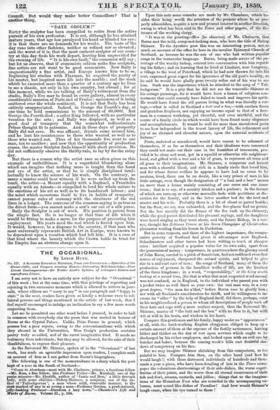"DATE OBOLUM!"
BarEr the sculptor has been compelled to retire from the active pursuit of his own profession. It is not, although he has attained mature years, that age has paralyzed his hand or blinded his eye; it is that there are no demands for his works. The taste of the day runs into other fashions, neither so refined nor so elevated ; and the worst of it is, that the most eminent sculptor of our coun- try at this day finds his work depart, leaving him unprovided for the evening of life. "It is his own fault," the economist will say ; but let us observe, that if economists seldom make fine sculptors, fine artists are not wont to be good economists. Now Baily is unquestionably a fine artist, and Europe knows him to be se. Beginning his studies with Flaxman, he acquired the parity of his master, but inspired more life into the marble ; and the work which he executed more than a quarter of a century ago he lives to see a classic, not only in his own country, but abroad ; for at this moment, while we are talking of Baily 's retirement from the studio, Baily's Eve may be found in every gallery, almost in every considerable mansion of Paris and of France ; specimens of it being scattered over the whole continent. It is not that Baily has been entirely unappreciated. Indeed, in George the Fourth's day, at one time he held commissions to the amount of 60,0001. But George the Fourth died ; a sailor King followed, with no particular vocation for the arts ; and Bally was displaced, as well as a good deal of trumpery that the somewhat indiscriminate Prince thought fit to patronise. And in those days of prosperity Bally did not save. He was affluent, friends came around him, and he lent his countenance to those who wanted as well as to those who wanted not. Thus of his thousands five went to one man, ten to another ; and now that the opportunity of production ceases, the master Sculptor finds himself with short provision. He did not sufficiently observe the thrifty rule, to lay by for the rainy day.
But there is a reason why the artist race so often gives us this example of nnthriftiness. It is a superficial blundering alone which can imagine that nothing more is taught than the hand and eye of the artist, or that he is simply disciplined intel- lectually to know the science of his work. On the contrary, as many a master could bear witness if he were called up from the tomb, the artist—a Mozart equally with a Raphael, a Praxiteles equally with an Ariosto—is compelled to lend his whole nature to the emotions of his art as well as to its handicraft labour ; and the mind which accustoms itself to live in habits of sympathy, cannot pursue rides of economy with the straitness of the red lines in a ledger. The converse of the common saying is as true as the direct form—you cannot make a sow's ear out of a silk purse. Baily the Sculptor is out of work. His position is patent from the simple fad. He is no longer at that time of life when it would be fitting to make a move for the purpose of procuring him employment. His years need the rest which is forced upon him. It would, however, be a disgrace to the country, if that man who most universally represents British Art in Europe, were known to be dependent upon a vocation which had left him. It is a case of that kind where the bounty which the Crown holds in trust for the Empire has an obvious charge upon it.


























 Previous page
Previous page